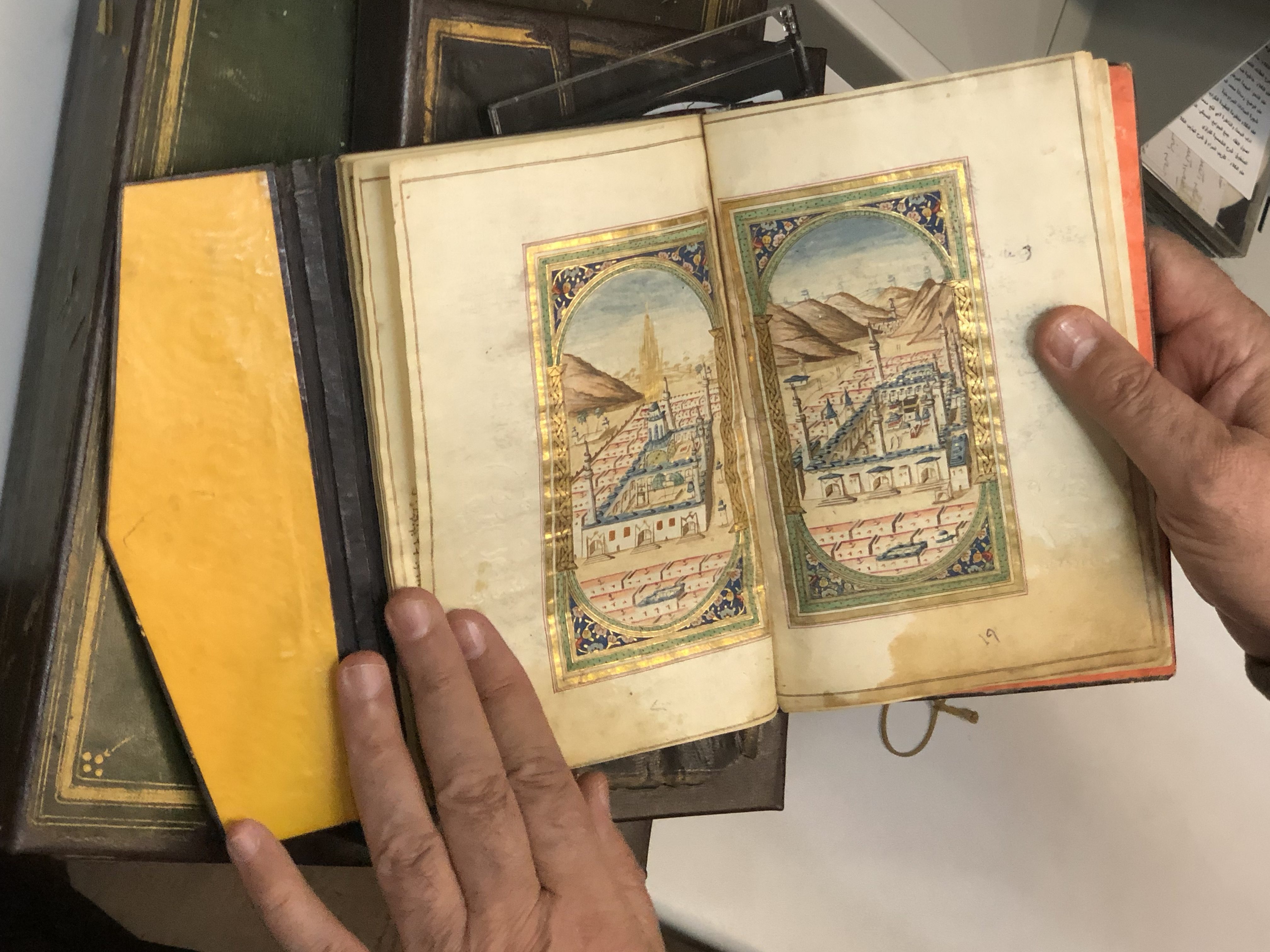
For the past decade I have been based in Los Angeles, where I’ve worked as a writer and translator focused on increasing the visibility of writers and communities yet to be represented in English. I’ve worked with the persecuted Chakma of Bangladesh to the displaced Batwa of Burundi, the indigenous Zapotec poets of Southern Mexico to the socially-engaged cartoonists of Malabo. In 2013, I founded the nonprofit publishing house Phoneme Media, which has since published over thirty books translated from twenty-five different languages, including the first-ever literary translations from languages like Lingala and Uyghur.
Compelled by the opportunity to learn more about a region actively occupied by the United States my entire adult life—and to experience the fullness of life here so often stripped of its richness in Western media depictions—I relocated to Iraqi Kurdistan on September 1, where I am now Artist in Residence at Kashkul, an arts and research collaborative housed at the American University of Iraq, Sulaimani (AUIS). My young Kurdish colleagues at Kashkul pursue projects of their own design—ranging from Crux, a study of when Islamic devotion turns to radicalism and whether it can be turned back, to Mosul Lives, an oral history project that gathers stories about life in Mosul before both the occupation of Isis and the U.S. invasion of 2003—in order to imagine what the city might become again. While working on my own writing projects, I’ve already been able to befriend emerging Ezidi poets, discuss Duchamp and Lorca with stateless Rhojelati artists, and meet Mosul’s “Sheikh of Calligraphy.”
In this yearlong column for The Logger, I will share stories of recent rebirth and ongoing resistance, a broader and more nuanced coverage of the individuals and organizations who embrace a determined optimism for the future while acknowledging the limitations and challenges of the present. Inasmuch as possible, I hope to fade into the background, an observer considerate of my complex position in this context, decidedly committed to showcasing local protagonists and their stories.
—David Shook
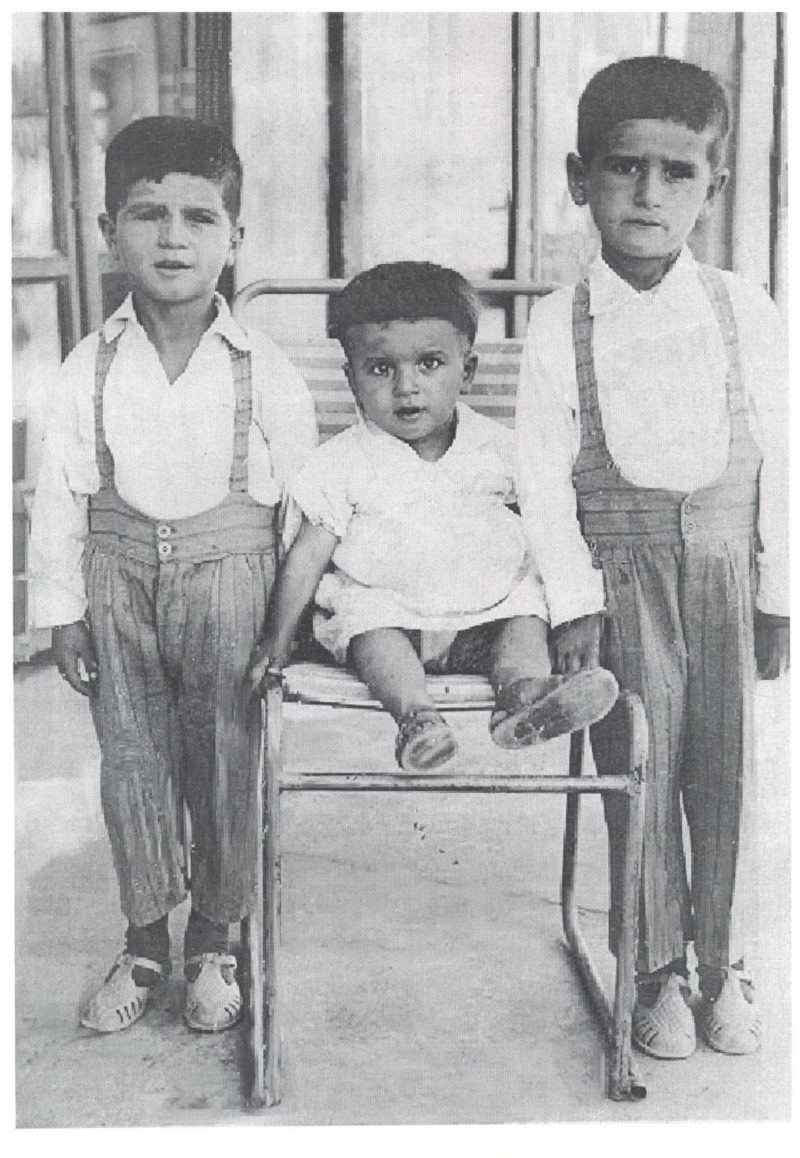
Much has been written about the courageous rebuilding of the Iraqi libraries destroyed by the Islamic State during its occupation of Mosul and other cities in the region. In adjacent Kurdish Iraq, the centuries-old struggle to build a repository of Kurdish culture and history has primarily and often necessarily continued with little visibility or fanfare, undertaken by willful idealists and brave individualists. Recently, I visited Zheen Archive Center, and met the people making that dream a reality. Here, two optimistic, broadminded brothers and an all-women team of crack manuscript preservationists are building a collection of books, manuscripts, and papers that have survived hundreds of years of language bans and the mass destruction of property that accompanied the countless murders of Saddam Hussein’s 1980s genocidal campaign, Anfal. Zheen—which means “life” in the Sorani dialect of Kurdish—houses the greatest collection of Kurdish cultural material of any other institution in the four contemporary nation-states that comprise the region of the Kurds, and probably the world. Remarkably, the Salih brothers formally founded Zheen in just 2004, and only acquired their present location, the nondescript four-story office building that houses its archives in northwest Sulaimani, in 2009.
With his white hair, neat mustache, and reading glasses hanging around his neck, Sadiq Salih looks very much the part of an archivist or librarian. When I meet him, he is standing over a long table in the periodicals room, carefully sorting through thousands of loose documents produced over the course of several decades, categorizing them by the political party that produced them. After we shake hands, he energetically explains his process, showcasing the stacks he has placed along two shelves of the archival bookshelf that runs the height and length of the large room’s wall. He rattles off the party names that represent five or six of the collections, but the only two categories that I can make out from the permutations of Ds, Is, Ks, Ps, and Us that make the parties’ acronyms are the Communist Party, whose literature here is not insubstantial. The multi-party political posters that he has stacked to one side will eventually migrate to another section of the archive.
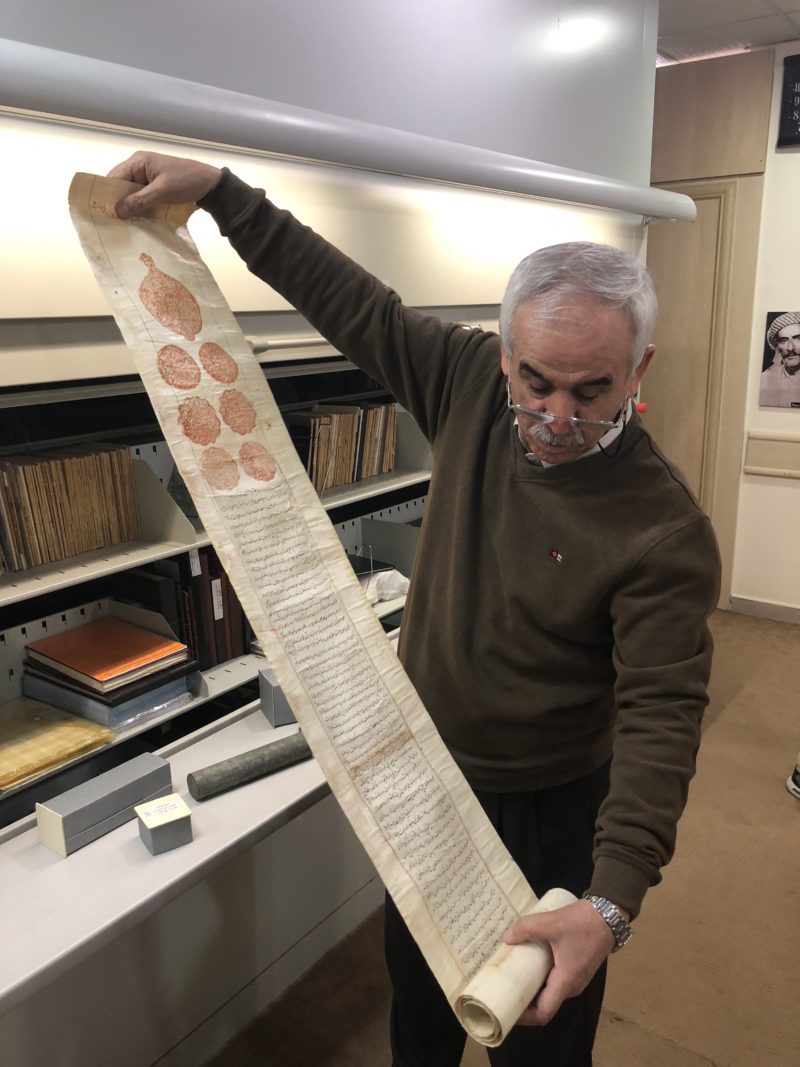
Together with his younger brother Sadiq, his closest friend since childhood, Rafiq directs the center, though their responsibilities span a far wider range of duties than a typical director’s. The two grew up in the city of Sulaimani, a hub of Kurdish culture since its founding in 1784 which served as a neutral meeting ground for the primary tribal powers of the time. Raised in a bookish family whose patriarch preached women’s equality, the brothers acquired their first manuscript in 1970, when Sadiq was just 13. Rafiq’s life mission began at a young age, when, in the fifth grade, he asked himself a question that soon began to haunt him: Why have I read the history of every place but Kurdistan? The answer, he soon realized, was that much of that history had been suppressed or destroyed, and that the books that still did exist were almost entirely inaccessible. “Because we live in a place that is so politically pressured,” he said, “we begin to think about politics even as children.” Sadiq recalls his father’s wisdom when the pair’s friends were joining the Peshmerga (Kurdish military forces). “He always encouraged us that there were many other ways to serve Kurdistan. I followed his advice and it is one thing that I’ve never regretted.” The brothers’ stewardship of the written word would be their work as cultural guardians.
Two decades after the teenaged acquisition of their first manuscript, in 1991, the Kurdish population of Iraq finally achieved limited self-governance. The brothers believed their dream would finally come true. Surely a Kurdish government would understand the importance of the preservation of Kurdish culture, and surely it would agree to fund the institutions necessary in order to do so. “At first we became hopeless,” Rafiq told me, when the nascent Kurdistan Regional Government proved that their work was not a priority. “But then we realized that because the government would not accept this responsibility, it was ours to take.”
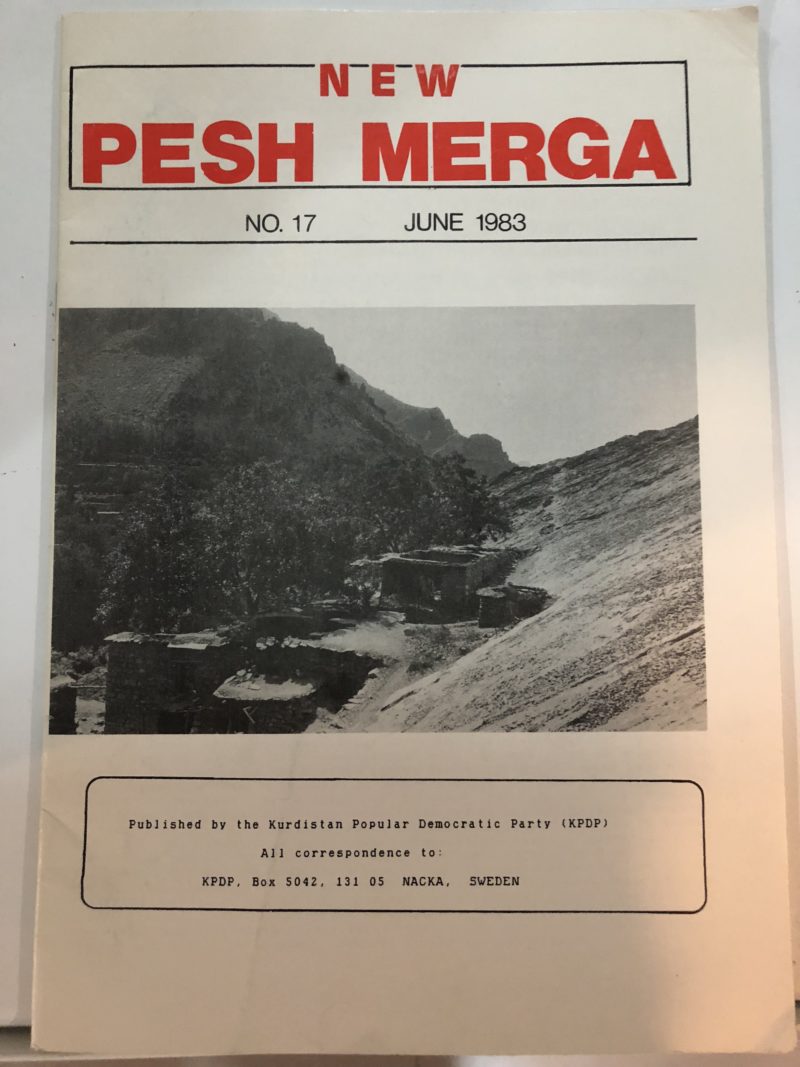
Before we leave the periodicals room, My eye is drawn to the cardinal red, sans-serif title of the June 1983 issue of The New Pesh Merga. The volume was published in Sweden by the KDP, the ‘80s acronym for today’s Kurdistan Democratic Party, one of two political parties that dominate the semiautonomous region. The English-language publication primarily features party news, but also contains an interview with the Turkish dissident filmmaker Yılmaz Güney, a Kurd, who had recently won the 1982 Palme d’Or at Cannes.
We walk a short way down the hall and enter his office, which we must pass through to enter the rare books room. “I like to have them close,” he says, referring to the books. First, he pulls down from an Arabic-Kurdish dictionary, published in 1892 and immediately banned in the Ottoman Empire. Despite its innocuous appearance, the publication of the black clothbound tome had been a radical act at the time, during a century-long language ban that considered even the academic documentation of the Kurdish language dangerously seditious. Next, he flips through a nineteenth-century verse translation of the Bible, the only extant copy in the world, published by The Syrian-American Press, a short-lived venture based on the southern edge of Greenwich Village in the 1910s. Then, the first publication of the medieval Kurdish emir Sharafkhan Bidlisi’s epic history of the kurds, the Sharafnama, finally printed in Saint Petersburg in 1860, over 250 years after his death.
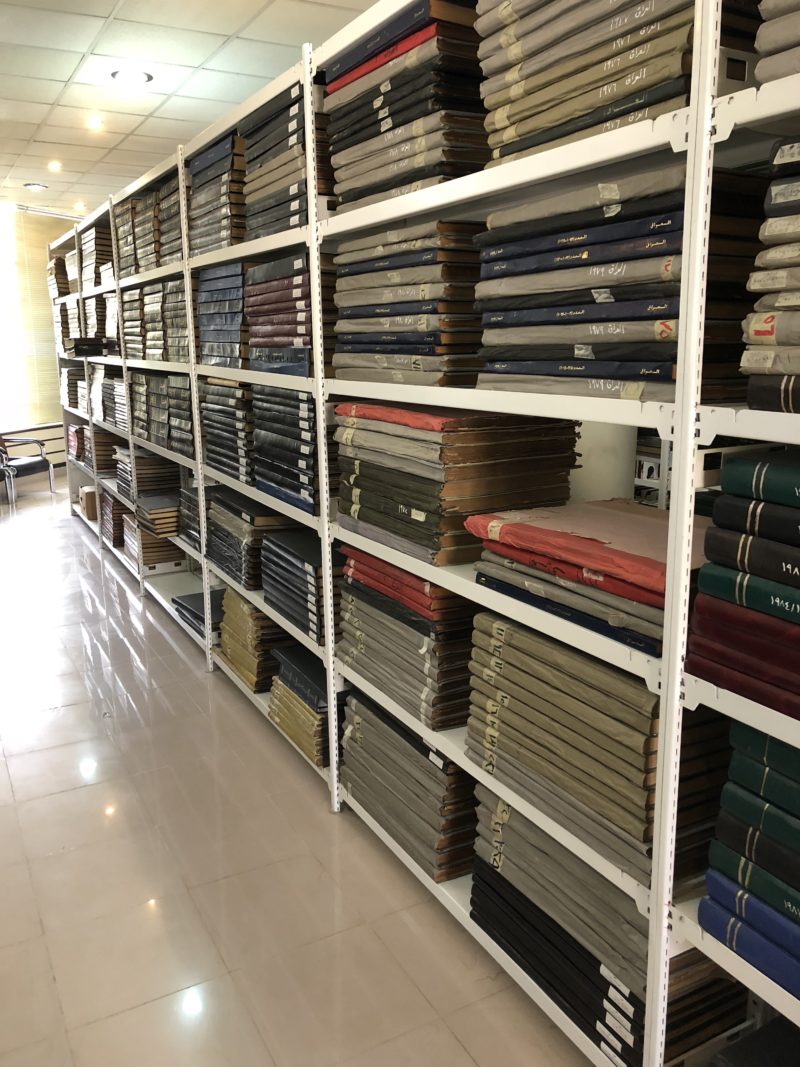
After the rare book room, we visit two of the archive’s complete personal libraries—one formerly owned by a sheikh, the other by a politician—both arranged to resemble their former owners’ libraries, complete with stationary and desktop knick-knacks. From there we visit the room where audiovisual materials are digitized (Zheen was the first organization in the region to include such materials in their archives) and then the facility’s microfiche library, where Rafiq explains how rigorous the center is about securing and backing up its data. At the end of each day, Rafiq receives a flash drive containing everything that has been digitized that day. He adds the new data to multiple identical hard drives there at Zheen headquarters, then takes it home to update a copy he keeps there. “Copies are kept in many places,” he assures me. In 2014, the Islamic State came within 35 kilometers of Sulaimani, sacking every major library in its wake. More recently, the brothers exercised an abundance of caution before the independence referendum held in late 2017, should it provoke any civil unrest.
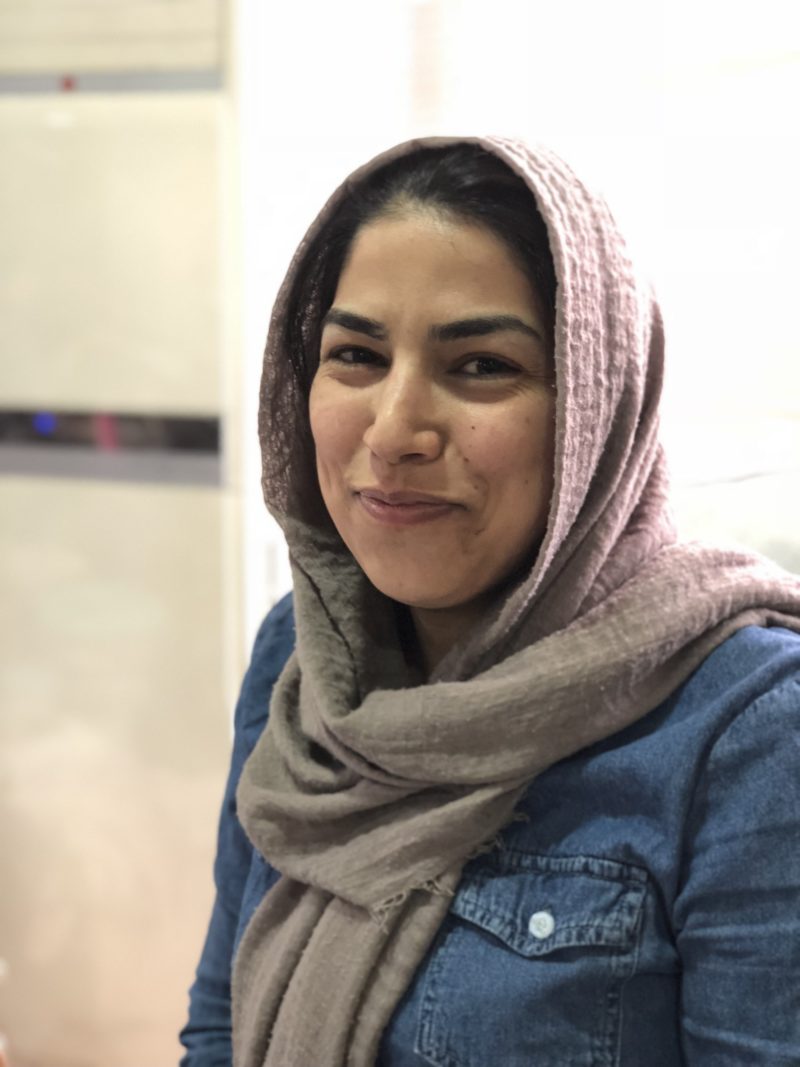
After my tour, Rafiq drops me off at the door to the room where the archive’s collections are brought for preservation and restoration. The brothers are proud that the department is staffed entirely by women, including Sadiq’s oldest daughter Lan. “When we were children,” Sadiq explains, “our father made sure we paid women the respect they deserve, and that they received all the education they desired. He was proud to call our home a haven for women.” I nod. “Things in this region aren’t designed to be as easy for women as they are for men. When we need to pee at the bazaar, we just stop at the mosque and pee. Women can’t. That’s just a small example. We are people who understand how much women here suffer.” We enter the room. Even in their greetings, the women of the department project a palpable self-confidence. They answer my questions directly, clearly proud of their specialized work, which they continue as we speak. When Rafiq takes his leave, their polite farewells are clearly collegial, not servile.
The department’s workroom contains advanced equipment available nowhere else in Kurdistan, including machines for paper restoration, often critical for preserving their collection of 1,431 different newspapers in Kurdish, Arabic, Persian, and Ottoman Turkish—most of them complete print runs. The room’s long worktables are furnished with a wide variety of scissors, string, and glue; a large paper drying rack dominates one corner of the room, and a family of book presses, decreasing in size like a set of matroyshkas, spans one expanse of wall. At a wood laminate desk at the edge of the room, one of the three women glue boards to black leather to reconstruct a book’s binding, dipping her brush into one of the small plastic buckets that usually holds mast, the region’s ubiquitous homemade yogurt. When I tell her that I thought the jar actually had contained mast, she explains that it is mast, and that it’s perfect for diluting binding glue.
Zryan A. Kareem has worked at Zheen for five years, since she was 25. Like the restoration team’s other members, she has been trained to do each of the restoration techniques practiced here, but she rarely glues bindings. “I’m slower than Ashti,” she explains, pointing her chin at the woman at the next desk. Zyran’s specialty is cleaning manuscripts, and that makes up the bulk of her work. “Fortunately Suli has no humidity or natural disasters,” she explains when I ask her what specific things deteriorate the manuscripts she sees. “The only danger is human.”
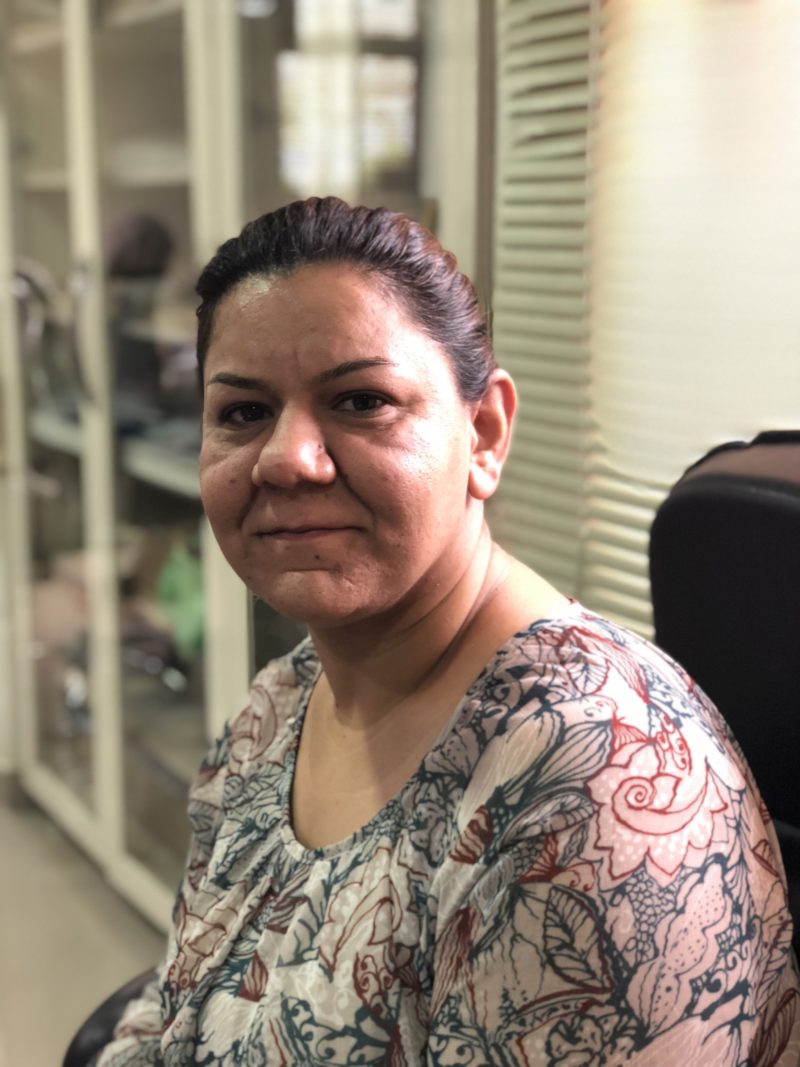
Zyran and her colleagues Ashti Ahmed and Lan Rafiq are the only professionals in Kurdistan working in this field, partly because this is the only place in Kurdistan dedicated to this work. All three of them studied preservation and restoration in Erbil, the capital of Kurdistan, some three hours away. The Ahmad brothers bring in foreign experts to teach new skills as often as they can. Zyran has even traveled to the Czech Republic to learn advanced techniques. Like Rafiq, the women of the department of restoration learned to love books as children. Zyran’s father, famous in his neighborhood for the personal library, worked at Zheen when she was young. “I’m very proud of my father for what he was able to create and to create inside of us. This was not common.” For her and Lan, working here seemed like the obvious path, at least in part because the organization’s mission so deeply aligned with the path their fathers set out for them. The building feels like a home to them, and the Ahmad brothers practice an organizational egalitarianism—the brothers even do their share of janitorial work—that the women tell me makes everyone feel like a family. Of the three, Ashti is the quickest binder. Her specialty is cleaning and restoring newspapers, and a stack of 1952 issues of a broadsheet newspaper called “The Day” sit on her desk. “I inadvertently became the expert,” she explains. “Once, when everyone else was busy, a huge collection of newspapers came in for restoration. I did a good job, so now I’m given every newspaper we get, even if I’m busy with something else.” At the kitty-corner desk, Lan is quietly patching small tears in the title page of a 1970 book about Kurdish newspapers with a paintbrush that she teases across a square plastic container filled with starch paste. “It makes me very happy to work with my father. All of my childhood I got to see him work and now I can do it alongside him.” I ask if she would like her children to work there, if she decides to have them. “Why not?” She smiles.
Before I leave Zheen, Rafiq returns to show me its collection of manuscripts, which are stored in a fireproof media storage system that proves complicated to open without the staff member charged with its operation. Eventually, we crack its sliding horizontal door to reveal a rotisserie of shelves holding books bound in ancient leather. Even at a glance I can make out their embossed covers and gilded edges. The interior machinery of the system thrums into motion, and once the appropriate shelf is before him, Rafiq retrieves Zheen’s oldest volume—its only incunable, so far. The illuminated Qu’ran from 1498 contains additional commentary in Persian, and its handwritten calligraphy distinguishes between the two languages, the Arabic in a surprisingly sharp red, the Persian perfectly black. The book was gifted to the organization by a prominent Sulaimani family who wanted it to be properly cared for and available for study. Next, he shows me a 300-year-old handwritten book about the Qu’ranic sciences, authored in Arabic by a Kurd; handwritten business observations from the turn of the twentieth century; early ‘90s transcriptions of political news communicated over walkie-talkie (the only way some rural Kurds could receive news in the mountains); and eighteenth-century handwritten Syriac-language texts by Christian Kurds.
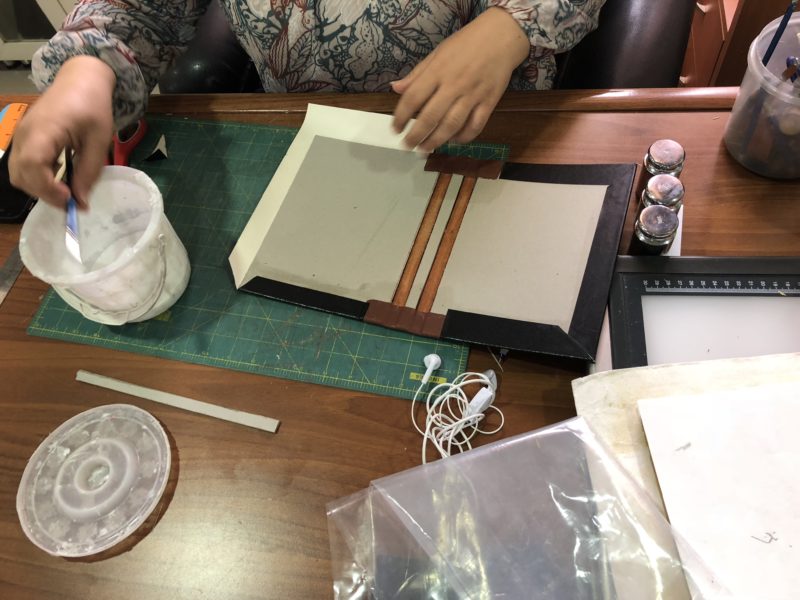
We speak about the future of Zheen, whose largest obstacle continues to be raising the funds necessary to survive as an independent organization. “What about social and political upheaval?” I ask. “Have you ever felt that Zheen’s collection was in danger of being destroyed?” Rafiq explains that during times of social unrest—most recently in the aftermath of last year’s referendum on Kurdish independence—he and Sadiq take many of the archive’s most valuable books and manuscripts to undisclosed locations for their protection. “If you don’t have hope,” he says, “you’ll die.” After a brief pause, he continues, “It hasn’t happened yet, but this country needs a cultural revolution. When it does, Zheen will be here for it, ready, waiting.”




